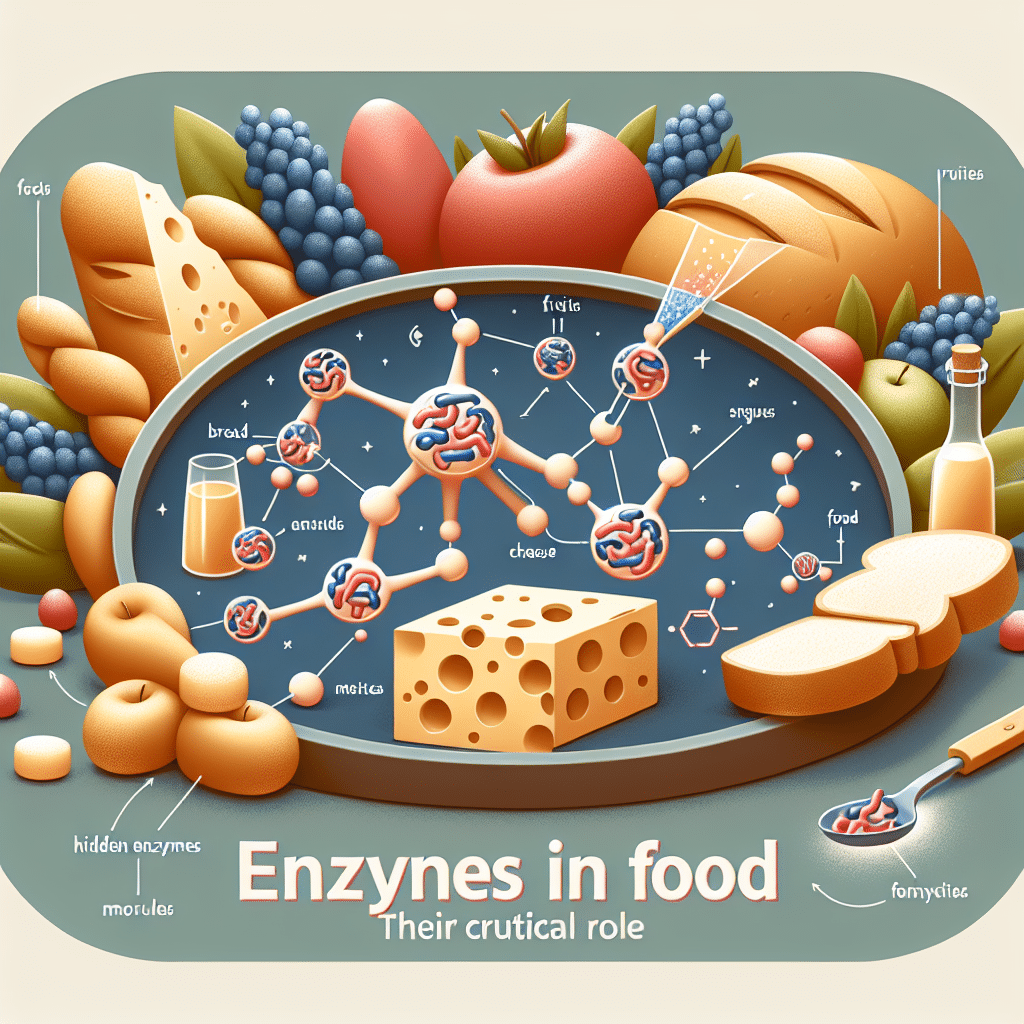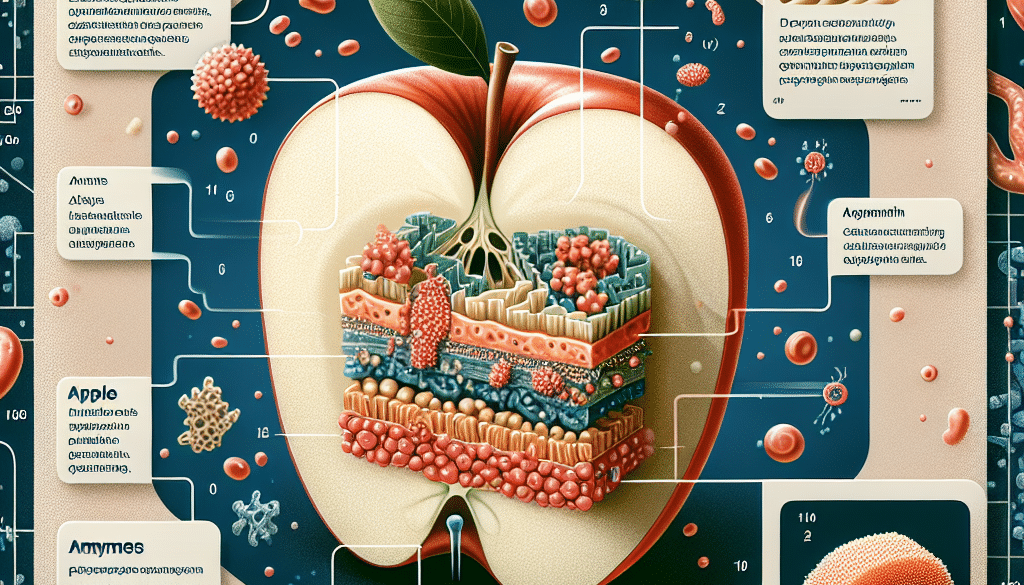Enzymes in Food: Their Crucial Role Explored
-
Table of Contents
- Enzymes in Food: Unlocking Their Essential Role
- The Fundamentals of Enzymes in Food Processing
- Enzymes and Their Role in Food Quality
- Health Benefits of Enzymes in Digestion
- Case Studies and Statistics: Enzymes at Work
- Conclusion: The Indispensable Nature of Enzymes in Food
- Discover ETprotein’s High-Quality Protein Products
Enzymes in Food: Unlocking Their Essential Role

Enzymes are nature’s catalysts, facilitating countless biochemical reactions in living organisms, including humans. In the context of food, enzymes play a pivotal role in everything from production to digestion. This article delves into the crucial functions of enzymes in the food industry, their impact on food quality, and their benefits for human health.
The Fundamentals of Enzymes in Food Processing
Enzymes are specialized proteins that accelerate chemical reactions without being consumed in the process. They are highly specific, meaning each type of enzyme catalyzes a particular reaction. In food processing, enzymes are harnessed for their ability to enhance flavor, texture, and nutritional value, as well as to increase shelf-life and reduce processing times.
- Flavor Enhancement: Enzymes such as proteases and lipases break down proteins and fats to release flavor compounds, improving the taste of cheese, meat products, and beverages.
- Texture Improvement: Amylases are used in baking to break down starches, resulting in softer bread with a better crumb structure.
- Nutritional Fortification: Phytases are added to animal feed to break down phytic acid, increasing the availability of phosphorus and other nutrients.
- Shelf-life Extension: Enzymes like lactase are used in dairy products to reduce lactose, thereby preventing spoilage and extending shelf life.
- Efficiency in Production: Enzymes can streamline production processes, reducing the need for harsh chemicals and high temperatures, which saves energy and maintains the food’s nutritional quality.
Enzymes and Their Role in Food Quality
Enzymes are integral to maintaining and improving food quality. They can be used to prevent undesirable changes in flavor, color, and texture that occur during storage and distribution. For example, enzymes like polyphenol oxidase are responsible for the browning of fruits and vegetables when cut, but their activity can be inhibited to preserve the fresh appearance of produce.
- Color Preservation: Enzymatic browning can be controlled by adding ascorbic acid or by reducing oxygen exposure to maintain the vibrant colors of fresh foods.
- Texture Maintenance: Enzymes such as pectinases are used in fruit juice production to break down pectin, clarifying the juice and improving its texture.
- Flavor Stability: Enzymes help in the removal of off-flavors, ensuring the consistent taste of food products over time.
Health Benefits of Enzymes in Digestion
Enzymes not only play a role in food processing but are also essential for human digestion. They help break down complex molecules like proteins, carbohydrates, and fats into simpler forms that the body can easily absorb.
- Proteases: Break down proteins into amino acids, aiding in muscle repair and growth.
- Amylases: Convert starches into sugars, providing a source of energy for the body.
- Lipases: Facilitate the digestion of fats into fatty acids and glycerol, which are essential for cell membrane integrity and energy storage.
Supplemental digestive enzymes can be beneficial for individuals with enzyme deficiencies or those with digestive disorders such as lactose intolerance or pancreatic insufficiency.
Case Studies and Statistics: Enzymes at Work
Real-world applications of enzymes in the food industry provide insight into their transformative effects:
- In cheese production, enzymes like rennet coagulate milk, shortening the cheese-making process from several hours to less than one hour.
- The use of transglutaminase, an enzyme that cross-links proteins, has revolutionized the meat industry by allowing smaller cuts of meat to be bonded into larger portions.
- Statistics show that the global food enzymes market size was valued at USD 2.3 billion in 2020 and is expected to grow, highlighting the increasing reliance on enzymes for food innovation and quality.
Conclusion: The Indispensable Nature of Enzymes in Food
In conclusion, enzymes are indispensable in the food industry. They enhance flavor, texture, and nutritional value, contribute to food safety and shelf-life, and play a vital role in human digestion. As the demand for natural and efficient food processing methods rises, enzymes will continue to be a focal point for innovation in the food sector.
Discover ETprotein’s High-Quality Protein Products
If you’re looking for top-notch protein products that complement the role of enzymes in food, ETprotein offers a range of organic bulk vegan proteins and L-(+)-Ergothioneine (EGT) that cater to various industries. Their products are characterized by a neutral taste, non-GMO, allergen-free attributes, and high purity levels, making them an excellent choice for your protein needs.
About ETprotein:
ETprotein, a reputable protein and L-(+)-Ergothioneine (EGT) Chinese factory manufacturer and supplier, is renowned for producing, stocking, exporting, and delivering the highest quality organic bulk vegan proteins and L-(+)-Ergothioneine. They include Organic rice protein, clear rice protein, pea protein, clear pea protein, watermelon seed protein, pumpkin seed protein, sunflower seed protein, mung bean protein, peanut protein, and L-(+)-Ergothioneine EGT Pharmaceutical grade, L-(+)-Ergothioneine EGT food grade, L-(+)-Ergothioneine EGT cosmetic grade, L-(+)-Ergothioneine EGT reference grade and L-(+)-Ergothioneine EGT standard. Their offerings, characterized by a neutral taste, non-GMO, allergen-free attributes, with L-(+)-Ergothioneine purity over 98%, 99%, cater to a diverse range of industries. They serve nutraceutical, pharmaceutical, cosmeceutical, veterinary, as well as food and beverage finished product distributors, traders, and manufacturers across Europe, USA, Canada, Australia, Thailand, Japan, Korea, Brazil, and Chile, among others.
ETprotein specialization includes exporting and delivering tailor-made protein powder and finished nutritional supplements. Their extensive product range covers sectors like Food and Beverage, Sports Nutrition, Weight Management, Dietary Supplements, Health and Wellness Products, and Infant Formula, ensuring comprehensive solutions to meet all your protein needs.
As a trusted company by leading global food and beverage brands and Fortune 500 companies, ETprotein reinforces China’s reputation in the global arena. For more information or to sample their products, please contact them and email sales(at)ETprotein.com today.












